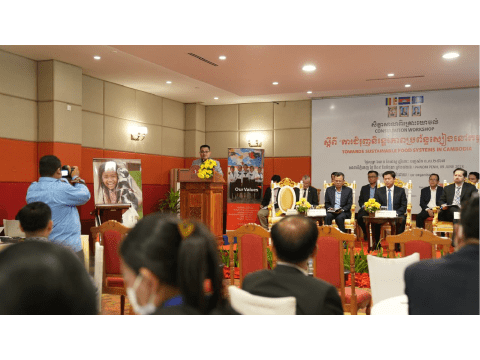Workshop explores sustainable food systems

Persistent levels of acute malnutrition over decades continue to be a concern, affecting the cognitive and physical development of young children, according to a press release from World Vision International Cambodia (WVI-C) on June 15.
WVI-C and the Council for Agricultural and Rural Development (CARD) recently organised a consultative workshop titled “Towards Sustainable Food Systems”. The workshop aimed to gain a better understanding of barriers and challenges in promoting sustainable food systems in Cambodia.
The press release highlighted that the Second National Strategy for Food Security and Nutrition aimed to reduce stunting among children from 32 percent in 2014 to 25 percent this year. However, the Cambodia Demographic and Health Survey (CDHS) 2021-2022 reported that the target had already been surpassed, with the rate at 22 per cent.
According to the CDHS data, there has been little change in acute malnutrition rates between 2014 (10 percent) and 2021 (9.9 percent), failing to achieve the set target of 8 percent.
Sok Silo, CARD secretary-general, emphasised the interconnection between the food system and nutrition, stating that they face challenges due to rapidly changing food environments. He mentioned that the Cambodian government has developed and disseminated regulations and necessary measures, including the Fast Track Roadmap to Improve Nutrition. CARD has also launched the Second National Strategy on Food Security and Nutrition 2019-2023.
Simultaneously, the Cambodian government has introduced the Roadmap for Food Systems for Sustainable Development 2030, along with sector-specific action plans and strategies. The goal is to “end hunger, achieve food security, improve nutrition, and promote sustainable agriculture” in order to enhance productivity and foster economic growth.
“There is a need to improve the collaboration between the stakeholders, especially at the national and sub-national, private sector, civil society organisations, and development partners especially to implement the policy and strategy,” Silo said. “We already have the policy, regulation and framework but we do need cooperation for implementing them effectively”.
Andreas Zurbrugg, deputy head of mission at the Australian Embassy in Cambodia, acknowledged the Australian government’s support of World Vision International programmes, with grants exceeding $46 million. One such programme, the Micro-Franchised Agricultural Service Expanded Phase 2 project focused on empowering male and female farmers in Takeo and Kandal provinces to improve economic outcomes through enhanced agricultural production.
“It is good to see the results of this project continue to be sustainable, even after the project closure, and contribute to improved nutrition and food systems,” he said.
Janes Imanuel Ginting, country director of WVI-C, emphasised the implementation of various agriculture and farm-based approaches, as well as skill development programmes at the community level. These initiatives aimed to enhance food systems and increase household income.
“However, at the national and sub-national level, challenges and barriers persist, which limit us from achieving sustainable food systems in the country. Identifying them and making an effort to overcome them would be game changers at the national level,” Ginting added.
Ginting added that as part of the event, WVI-C and CARD facilitated group discussions to explore challenges, recommendations, and solutions.
These insights will potentially be incorporated into the upcoming ‘Third National Strategy for Food Security and Nutrition,’ emphasising the commitment to addressing the issues at hand.
Article By: The Phnom Penh Post